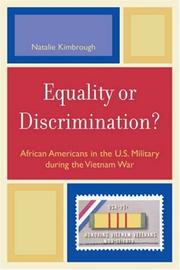| Listing 1 - 5 of 5 |
Sort by
|

ISBN: 0761836721 9780761836728 Year: 2007 Publisher: Lanham [etc.] University Press of America
Abstract | Keywords | Export | Availability | Bookmark
 Loading...
Loading...Choose an application
- Reference Manager
- EndNote
- RefWorks (Direct export to RefWorks)
Book
ISBN: 9786613930620 1283618176 1442217871 9781442217874 1442217855 9781442217850 9781442217867 6613930628 9781283618175 Year: 2012 Publisher: Lanham, Md. Rowman & Littlefield
Abstract | Keywords | Export | Availability | Bookmark
 Loading...
Loading...Choose an application
- Reference Manager
- EndNote
- RefWorks (Direct export to RefWorks)
Disposable Heroes illuminates challenges facing many African American veterans. Rather than finding military service to be a path to upward mobility, these veterans fight just to survive. Drawing on in-depth interviews with veterans of Vietnam and recent wars, as well as national survey data, the book shows the ways America fails black veterans today.
African American veterans --- Afro-American veterans --- Negro veterans --- Veterans, African American --- Veterans --- Social conditions. --- Services for.
Book
ISBN: 1476625484 9781476625485 9781476662985 1476662983 Year: 2016 Publisher: Jefferson, North Carolina
Abstract | Keywords | Export | Availability | Bookmark
 Loading...
Loading...Choose an application
- Reference Manager
- EndNote
- RefWorks (Direct export to RefWorks)
"When the Tuskegee Veteran's Hospital opened in 1923, many in the Veteran's Bureau believed that black physicians and nurses were not competent to staff the facility. Except for nurses' aides, orderlies, attendants and laborers, hospital personnel would be white. The history of the hospital reflects the struggle for racial equality in the United States"--
African American veterans --- African American physicians --- Military hospitals --- Medical care --- History --- Tuskegee Veterans Hospital.
Book
ISBN: 9798890850386 1469664550 9781469664545 1469664542 9781469664552 9781469664538 1469664534 Year: 2021 Publisher: Chapel Hill Baltimore, Md.
Abstract | Keywords | Export | Availability | Bookmark
 Loading...
Loading...Choose an application
- Reference Manager
- EndNote
- RefWorks (Direct export to RefWorks)
Journalists began to call the Korean War 'the Forgotten War' even before it ended. Without a doubt, the most neglected story of this already-neglected war is that of African Americans who served just two years after Harry S. Truman ordered the desegregation of the military. 'Twice Forgotten' draws on oral histories of Black Korean War veterans to recover the story of their contributions to the fight, the reality that the military desegregated in fits and starts, and how veterans' service fits into the long history of the Black freedom struggle. This collection of seventy oral histories, drawn from across the country, features interviews conducted by the author and his colleagues for their 2003 American Radio Works documentary, Korea: The Unfinished War, which examines the conflict as experienced by the approximately 600,000 Black men and women who served.
Korean War, 1950-1953 --- African American veterans --- Participation, African American. --- African Americans. --- Social conditions
Book
ISBN: 0691140030 1282303783 9786612303784 1400831024 9781400831029 9780691140032 9780691140049 9781282303782 0691140049 6612303786 Year: 2009 Publisher: Princeton, NJ
Abstract | Keywords | Export | Availability | Bookmark
 Loading...
Loading...Choose an application
- Reference Manager
- EndNote
- RefWorks (Direct export to RefWorks)
Fighting for Democracy shows how the experiences of African American soldiers during World War II and the Korean War influenced many of them to challenge white supremacy in the South when they returned home. Focusing on the motivations of individual black veterans, this groundbreaking book explores the relationship between military service and political activism. Christopher Parker draws on unique sources of evidence, including interviews and survey data, to illustrate how and why black servicemen who fought for their country in wartime returned to America prepared to fight for their own equality. Parker discusses the history of African American military service and how the wartime experiences of black veterans inspired them to contest Jim Crow. Black veterans gained courage and confidence by fighting their nation's enemies on the battlefield and racism in the ranks. Viewing their military service as patriotic sacrifice in the defense of democracy, these veterans returned home with the determination and commitment to pursue equality and social reform in the South. Just as they had risked their lives to protect democratic rights while abroad, they risked their lives to demand those same rights on the domestic front. Providing a sophisticated understanding of how war abroad impacts efforts for social change at home, Fighting for Democracy recovers a vital story about black veterans and demonstrates their distinct contributions to the American political landscape.
African American veterans --- African Americans --- Civil rights movements --- Afro-American veterans --- Negro veterans --- Veterans, African American --- Veterans --- Afro-Americans --- Black Americans --- Colored people (United States) --- Negroes --- Africans --- Ethnology --- Blacks --- Political activity --- History --- Civil rights --- Southern States --- Race relations --- Black people
| Listing 1 - 5 of 5 |
Sort by
|

 Search
Search Feedback
Feedback About UniCat
About UniCat  Help
Help News
News